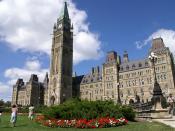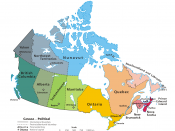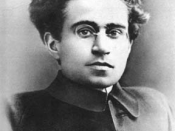There is an elite force at work in this country. This hand-full of people are the gatekeepers of the status quo. They are the Canadian media elite. It is no secret that newspapers and television are vital to the health and vitality of a democracy. These institutions are essential to the maintenance of the political machine. In Canada, there is a chilling connection between the media elite and political power. These two bodies work together to promote and to benefit from the political culture of the dominant ideology, liberalism and consumerism. In the following essay I will discuss the phenomena of the Canadian media elite. I will explain the ambitions of the media elite. I will also illuminate the agenda of the political elite in terms of Gramsci's theory of hegemony.
The existence of the media elite is proved by its concentration of ownership. The media elite in this country are the handful of families who own and operate a majority of these newspapers, internet site, radio, and television stations.
Some notable companies are the Irving family in New Brunswick, Quebecor, "Power Corp." owned by Paul Desmarias and closer to home, CanWest Global Communications which is owned by president and CEO by Leonard Asper of Winnipeg. As of February 2001, the ownership of Canadian daily newspapers has CanWest Global (26.5% of media ownership) owning the following dailies: National Post (ý) St. John's Telegram Corner Brook Western Star Charlottetown Guardian Summerside Journal Pioneer Halifax Daily News Sydney Cape Breton Post Truro Daily News New Glasgow Evening News Montreal Gazette Ottawa Citizen Windsor Star St. Catharines Standard Brantford Expositor Niagara Falls Review Welland Tribune Regina Leader-Post Saskatoon StarPhoenix Moose Jaw Times-Herald Prince Albert Daily Herald Calgary Herald Edmonton Journal Vancouver Sun Vancouver Province Victoria Times-Colonist Nanaimo Daily News Port Alberni Valley Times This list refers only to their news dailies. The Aspers also own a host of television stations from coast to coast. The concern is of course that "too much concentrated media ownership potentially puts too much political and cultural power in too few hands".( The Missing News 55) The problem starts with the fact that newspapers and television are profit driven businesses. Newspapers are owned by chains. They are owned by people who own other businesses. Despite the fact the newspapers play a role in democracy, The Kent Commission determined that "all the owners tend to see it as a business and see it through profit and losses". How do the elite amass their wealth? The power elite are wealthy not through the sale of their daily, but by the sale of advertising space. The greater the circulation of the daily or the higher the ratings of a television program, the greater the value of the advertising space. For their part, advertisers will turn to the media to attract the most readers and viewers. "Thus, most modern metropolitan newspapers are no longer about, or even primarily about, the presentation of news, but are multidimensional institutions that entertain readers in a number of ways". (Johnston) The switch from a news media with integrity to one based on the bottom line reflects the ideology of that particular group of owners. Any business owner who wanted to stay in business would obviously have to adopt a mainstream, capitalist view, in order to keep making money. This is called consumer logic, or in more colloquial terms, not biting the hand that feeds you. Roy Thompson once said: "I buy newspapers to make money to buy newspapers to make more money. As far as editorial content, that's the stuff you separate the ads with" ( Mediasaurus 13) Historically the news paper gave the news to people in the entire country. Now it is watered down, easy to digest, "junk-food journalism". The news business understands its audience. Producers and owners alike know that the average consumer does not want to read stories that are too long or too depressing. Stories need to be interesting in order to keep the reader or viewer buying the paper or watching the program. This is what causes journalists to become "Stenographers with amnesia." (The Missing New, 59) Journalists are not to blame however. They give up have a lot to lose when they give up their jobs. If there is a member of a news team who does not care to up hold the views of his/employer, he/she will lose his/her position and in so doing, lose the ability to work for most other newspapers or stations. This is of course due to the fact that they are all generally owned by the same people. So the media elite control the ownership, the profit, and careers.
One can argue that the media is more important than other businesses, but one of the most valuable differences between the business of the news and the business of widget making is that newspapers attract more attention from people in high places. "Television is a form of mass media and a tool of socialization" (Barnhurt, 678).
In Canada, the media elite, political power and political culture are instrumental in creating Canadian democratic reality. When a television viewer, sedated by "infotainment", has a choice between a political debate and a spoon fed sitcom, he/she invariably chooses the sitcom. This helps mold the citizen into complacency, keeps them out of trouble, working, and effectively "sleep walking through life".
"Political culture is the attitudes; values and beliefs citizens have about politics" (Johnston). The power of such a mass media can in fact broadcast the reality that the viewer lives within.
The attitudes of the owner of papers and TV stations trickle down into the populace. As Siegel contends, "much of what we know about political affairs comes from the media; they are carriers of information, thought, and opinion" (The Missing News 13) People have a natural tendency to obedience, they casually digest what is being fed to them by the media. We are bombarded every day by images and attitudes of advertisers. The editorials of the hand picked journalists are sure never to offend the interests of their employers. His means that it is not only advertising that makes it into our reality, but also the popular views of the liberal, consumer minded capitalist owners, essentially the views of the media elite.
"The corporate elite want a cultural hegemony to further commercial endeavors" (Carroll, 11) Consumerism is propagated in the media by the effects of Gramsci's notion of hegemony. In the cultural hegemony, the public believes in one concept of reality dictated by the bourgeoisie class (Brodie, 408) The dominant ideology in Canada is liberalism, which promotes free market rule controlled by the Adam Smith's concept of the 'invisible hand' and the 'night watchman' (Brodie, 26) Political parties stand to benefit greatly when the attitudes of the status qou is kept firmly in check. A state of hegemony obviously translates into votes. And so the kinship between the political powers and the media elite are forged. When the majority of a population "buy into" consumerist values and liberalism, the government does not need to explain itself.
This is why Gramsci's notion of hegemony is so important. With a subdued public, the notions of what is best for the country are affected. The role of the media has increased its worth to those who have political power. Noam Chomsky maintains, "what is essential is the power to set the agenda" (48).
Walter Lippman used the term "the manufacture of consent" to describe the process whereby governments attempt to shape public opinion through their selective use of information.( Business Influences, 250) After his intensive research into Canada's "cultural industries", Paul Audley argued that the corporate news media in Canada maintain "basic commitment to the business community's views on issues rather than to the wider range of interests".( The Missing News 58) Under such circumstances, news that casts business in a bad light is very likely to go unreported.
A great way to express the connection between these all too important institutions is to look at the Irving family in Nova Scotia. It is estimated that one in every three people in Nova Scotia are employed by this family (Mediasaurus, 4).
Their empire in the province reaches from TV and Newspaper, to pulp and saw mills, forestry, ship building, land ownership, a dry dock, oil refineries, fleets of oil tankers and fishing vessels, a tug boat company, a chain of gas stations, and a bus line. There was a case in the 1980's when a ship owned by the Irving, hauling dangerous toxins, sank off the Atlantic coast. Because the Irving family owns the news papers and access to media, the story was never brought to the attention of the people. In fact no action was taken whatever due to the fact that Irving could not be touched.(The Missing News, 60) The media is the only business in Canada that has protection under the constitution. This fact in itself underlines the importance of the freedom of the press. Without it there would be a placation of democracy, an erosion of our prized system of government. However, Canada's premiere journalist Linda McQuaig points out, "We must always remember that virtually all media outlets are owned by the rich, powerful members of the elite. To assume that this fact has no influence on the ideas they present would be equivalent to assuming that, should the entire media be owned by, say, labour unions, women's groups or social workers, this would have no impact on the editorial content (xv).






